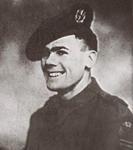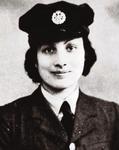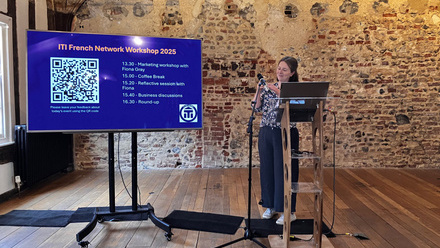At war without words
Written by Roger Haycock
How did the undercover agents of WWII manage the language? As Roger Haycock discovered, some spoke no French at all – and operated without interpreters.
On 11 September 1944 a Special Air Service (SAS) patrol of nine men in three jeeps was passing through the village of Damrémont in occupied north- eastern France when villagers called to warn them that there was a slow- moving German convoy ahead. While they were waiting for it to pass, the corporal decided to clean the machine gun. Unfortunately there was a round left inside, and when he removed the lid of the magazine, it went off and it fatally wounded paratrooper James Downey.

James Downey of the SAS, fatally wounded in Damrémont in 1944.
I first heard about James Downey 61 years later, after my wife and I had bought a house in Damrémont. Then in 2017 I was asked to research him further, as part of the village plans to add his name to the village war memorial. I unexpectedly became a historian and started learning about Maquis groups within the French Resistance, and clandestine operations of the SAS and Strategic Operations Executive (SOE) in the summer and autumn of 1944.
Around the time of my research, I also read Richard Lackey’s feature in the Bulletin about his grandfather who was an interpreter during the Second World War for French pilots stationed in Yorkshire; and I started wondering about the people taking part in clandestine operations in hostile enemy-occupied France. How did they manage the language? When I looked into it, it turned out that even those who were reputedly fluent in French could often have benefited from the services of an interpreter.
Early undercover agents
SOE began parachuting agents into France shortly after the start of the German occupation in 1940. They were rquired to speak French and their job was to encourage, arm and aid the French Resistance. They were organised into circuits and operated in particular areas. By D-Day on 6 June 1944 there were over 400 of them in France.

Noor Inayat Khan, though a fluent French speaker and agent of huge courage and resourcefulness, she spoke French with a slight accent.
The main recruiter for F Section (the independent French section of SOE) was army officer Selwyn Jepson, who assessed the candidates’ language skills during a short initial interview – just a chat in French. Many of us know about the well- known agents such as Violette Szabo (code name Louise) and Noor Inayat Khan (code name Madeleine), who were all known to speak fluent French. However, even they had their problems with the language.
Violette Szabo had a French mother and had lived in France, so she was considered ideal; it was not till her first mission that her circuit organiser told her to speak as little as possible because she had a marked English accent. He said that she could have passed as Alsatian – but then she would have been expected to able to speak German. Noor Inayat Khan was also reported to speak both English and French with a slight ‘foreign accent’, even though she had lived in France.
In his book Maquis, George Millar (code name Emile) admits freely that he could never have passed properly for French but was confident he could fool the Germans. Millar, who was the Paris correspondent for the Daily Express newspaper before the war, spoke French with a thick Scottish accent.
He looked at Dormer’s identity card and passed it back, but when he got to Birch he inspected his (forged) card carefully for several seconds and then asked him something in French. Dormer, whose heart nearly stopped, was preparing to get out of his seat and intervene, but Birch just shrugged his shoulders and stared at the floor. Fortunately for them, the German gave Birch a contemptuous glance suggesting that he did not have time to waste talking to such an illiterate oaf and passed on down the corridor to examine the rest of the train.
Fighting with no French
From D-Day onwards, these agents were joined by more people, some of whom spoke no French whatsoever. Operation Jedburgh parachuted small groups in to conduct sabotage and guerrilla warfare in occupied territory. They had been recruited and trained well before D-Day, but for security reasons they had been kept back until the Allied invasion of France had started. They were typically made up of teams of three: two officers (one French and one an Allied national) and a radio operator (who was usually a sergeant). They were recruited for their daring and willingness to volunteer for service as commandos.

Violette Szabo, though a fluent French speaker and agent of huge courage and resourcefulness, she spoke French with a slight accent.
The Allied officer needed to speak some French, and indeed most British army officers came from a public- school or grammar-school background, where they had learned the language (at least to some degree). The radio operator, however, did not – and in fact most British soldiers in other ranks spoke none.
One radio operator, Harry Verlander, wrote about his experiences and explained that he had responded to a notice on an army noticeboard: ‘Wireless Operators, for special duties which may include parachute training. Knowledge of a foreign language would be an advantage but not essential.’ He applied because he knew at least two French nursery rhymes. The obituary of another radio operator, Jack Grinham, who was a member of team Stanley, which operated in my area of France, says that he parachuted into France without being able to speak a word of French.
Although these organisations were independent, they interacted with each other. For example, the SOE agents would arrange reception for the Jedburghs and SAS when they infiltrated into France, and they all collaborated with the Maquis (French Resistance groups). Then there was a circuit called Glover, which operated in the area where I live in France. This consisted of two American operatives, André and Freddy. Both had French roots, had been educated in France and were native speakers, but according to a maquisard who was present when they parachuted into France, Freddy had an accent.
I am particularly interested in operations Wallace and Hardy, carried out in the Plateau de Langres, which retreating German armies had to cross and which is thickly forested (so troops could hide in it). In July Captain Grant Hibbert started building up Operation Hardy, and on 19 August Major Roy Farran started Operation Wallace, leading 20 jeeps and 60 men to join the Hardy troops.
However, Farran depended on a French officer, Captain Ramon Lee, to talk to local people and gather intelligence about enemy movements and positions. Lee led the squadron through a series of disastrous and fatal decisions. Yet he was kept in charge, even when Farran was furious with him, solely because Lee was the only person who could communicate in French.
Success but at a cost?
Considering how much training SOE agents were given in avoiding surveillance and establishing their cover stories, it is surprising how little attention seems to have been given to perfecting their language skills and to working on their accents and lack of fluency. It is also puzzling that interpreters were not included in SAS operations, given that there were other specific jobs such as drivers, radio operators and mechanics – not to mention doctors and clerics.
Even in the literature about these agents, very little is attributed to language problems. Yet these were people whose lives depended on communication. What is more, other people’s lives depended on it too. Operation Wallace, for instance, is a devastating example of the cost of this lack of language provision. If Farran had been supplied with an interpreter, he could have avoided the conflicts, and prevented Lee from depriving him of nearly half his men and materials.
General Eisenhower, the Supreme Commander of the Allied Expeditionary Force in Europe, believed that the efforts of clandestine forces and the French Resistance reduced the duration of the war by six months and overall were successful. But it is a shock to realise how many of the people engaged in some of the most difficult and dangerous work of the entire war were operating without interpreting support, in a language they didn’t know well or might not know at all.
This article appeared as the cover article in the May-June 2020 edition of the ITI Bulletin.
About the writer

Roger Haycock is a professional electrical engineer who has always been interested in languages. He has an MA in Translation Studies and translates French into English. Roger has grown up with computers and has kept all those he has owned, starting with an Acorn Atom, the forerunner to the BBC computer, followed by 386s through Pentiums to today’s multicore devices. As a result he finds translation technologies fascinating and is now studying machine learning. He can be contacted by email: [email protected].
Never miss another Bulletin article

If you would like to read more features and articles on a wide variety of subjects relating to all aspects of the translation and interpreting industry, subscribe to ITI Bulletin. Alternatively, join ITI and get a free subscription included in your membership.






